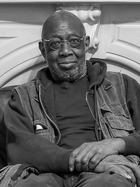
Charles is an Emmy award-winning documentary producer, with a career spanning 50 years. He’s worked with the BBC and PBS; taught at NYU film school; and served as a Fulbright Scholar.
“I’m a news junkie,” he says of his passion for his work. “I love travel, and keeping up with current events. I like stories, and being a filmmaker gives you the opportunity to tell stories.”
In 2008, Charles was diagnosed with sarcoma after noticing a large bump on his right leg. By the time it was found, the cancer had progressed to the point that Charles’s health care team recommended amputation of the right leg above the knee.
“My surgeon was pretty candid - it wasn’t a good prognosis. I was calling friends, and they couldn’t believe my mood. I was in a lot of pain before my surgery, but the guilt of being so stupid, and letting it get to that point, was really what ate at me. But like a lot of guys, I ran from doctors.”
After the surgery, Charles went through a few rounds of chemotherapy. Despite the initial grim prognosis, he pulled through. “I’ll never forget this moment: The oncologist came to the infusion center. She looked at the previous results, and she sat there and didn’t say anything. Then she said ok, we’re not going to do anything today.”
For the next seven years, Charles was considered cancer-free. Then, three years ago, he experienced a recurrence.
“I was very sick, and I lost of a lot weight,” he recalls. “I went in for more chemo, but it was at the point where we were talking about hospice.”
That’s when Charles called CancerCare, and began meeting with an oncology social worker for individual counseling. “My social worker wanted me to talk about mortality. I did not really want to hear it. It was disturbing to even think about. But I trusted him, and those conversations ended up making a huge difference.”
Once a week, he’d speak with his oncology social worker, Richard Dickens, MS, LCSW-R, at CancerCare’s New York office or via phone. “Because of the amputation, it’s harder to get around. Having the option to do my counseling session in-person or over the phone really helped.” Their sessions gave Charles space to talk about the stresses of treatment and learn skills to cope.
“Even though it’s now almost ten years since I was diagnosed, make no mistake about it, whenever I have to visit the hospital and see the oncologist, that’s really stressful,” he says.
When asked to share a message with others coping with cancer, Charles says: “Connecting with CancerCare should be a no-brainer. It’s a great organization, and it’s certainly good to have someone to talk to.” In addition to individual counseling at CancerCare, Charles also attends a support group for amputees. “I’ve met some remarkable people who are living normal lives,” he says.
“A while ago, I remember seeing someone else who had a major amputation, and I remember thinking, ‘How can he be cheery? How can he smile?’ But then I remembered that even with all I’ve been through, I still like jokes. I can look at things and laugh.”
At the moment, Charles is back in treatment, and so far he’s doing well. He continues to work as a documentary filmmaker, and strives to maintain a positive outlook. “There are a lot of things I didn’t think I would have the chance to do. I’m still working on projects. I’ve worked in France, and taught at an art institute in Italy. I’ve had relationships, experienced love. I have lots to be proud of.”
